Only collective security can protect fragile economic models.
Andrew Leber
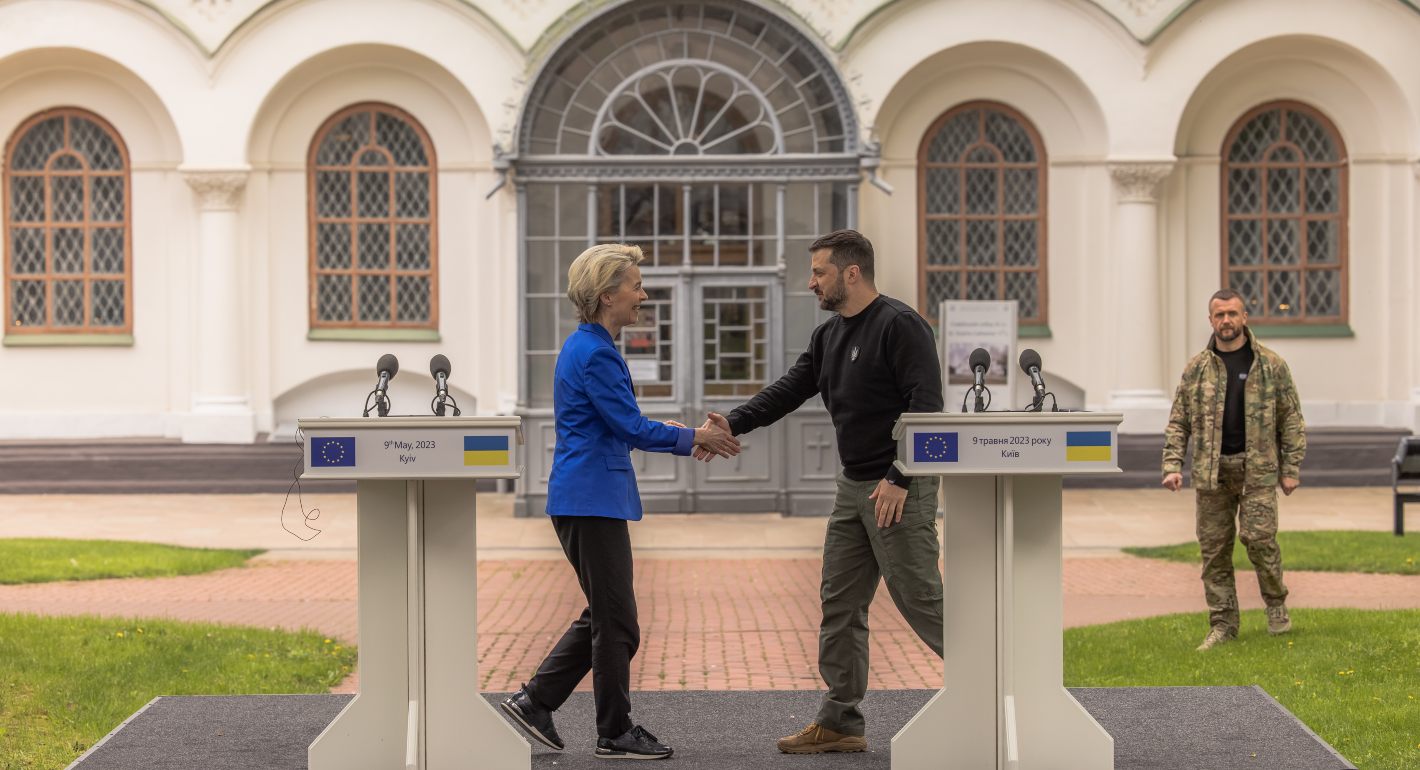
Source: Getty
The steadfast support for European integration among Ukrainians is rooted in a perception of the EU as a community of shared democratic principles. The union should leverage its democratic appeal to solidify its role as a catalyst for change beyond its borders.
This publication is part of Ukrainian Voices, a Carnegie Europe project that sheds light on Ukraine’s political and social dynamics by highlighting the perspectives of local experts.
Ukraine’s quest to join the EU can be traced back to the early 1990s, immediately after the country gained its independence. Since the very beginning of its state-building journey, most of Ukraine’s leaders have officially declared that the country is EU bound—even if several simultaneously sought to maintain or even deepen Ukraine’s economic and political ties to Russia. But unlike for their neighbors in Hungary, Poland, Romania, and Slovakia, the EU’s welcome mat was never laid out for Ukrainians.
Some observers have argued that popular support for EU accession was not there in Ukraine in the same way it was in, say, Poland. Indeed, backing for Ukraine’s EU membership was slow to rise—potentially because of a perception that Ukraine’s accession was a highly unlikely prospect, and not least as a result of the EU’s hesitancy and existing members’ accession fatigue.
Other analysts have argued that Ukraine’s integration into the EU would provoke a response from Russia and should thus be avoided. Yet, this view did not stop Ukrainian leaders from pursuing a European course, and over time, the aspiration of EU membership also became deeply ingrained in Ukrainian identity, reflecting the country’s increasingly broad cultural and political alignment with Europe, rather than merely its geographic proximity. In fact, the policy of integration with the EU was supported by all of Ukraine’s presidents from across the political spectrum, who saw it as economically and politically advantageous for the country. That is, until former president Viktor Yanukovych infamously reneged on his electoral promise to sign an Association Agreement with the EU in November 2013 and sparked the Euromaidan mass mobilization.
Unsurprisingly, in the aftermath of the protests and Russia’s invasion of the regions of Donetsk and Luhansk and annexation of Crimea, ordinary Ukrainians’ desire to join the EU intensified dramatically. This drive to enter the EU is rooted in a perception of the bloc not only as a political and economic union but also, more importantly, as a community of shared values and democratic principles. When Ukrainians rallied around democracy, they also rallied around the idea that Ukraine’s place is in the EU.
There were likely many variables at play in the consistent rise in support for Ukraine’s EU membership prior to Russia’s all-out invasion in 2022 (see figure 1). While the two mass mobilizations in 2004 and 2013–2014 played a vital role in shoring up pro-EU sentiment among key constituencies, the top candidates in the 2019 Ukrainian presidential election all agreed on Ukraine’s EU trajectory. Whether the country would strive to join the EU was no longer an area of policy debate but rather a matter of discursive cohesion. Politicians were neither able nor willing to divide the electorate on these geopolitical grounds.
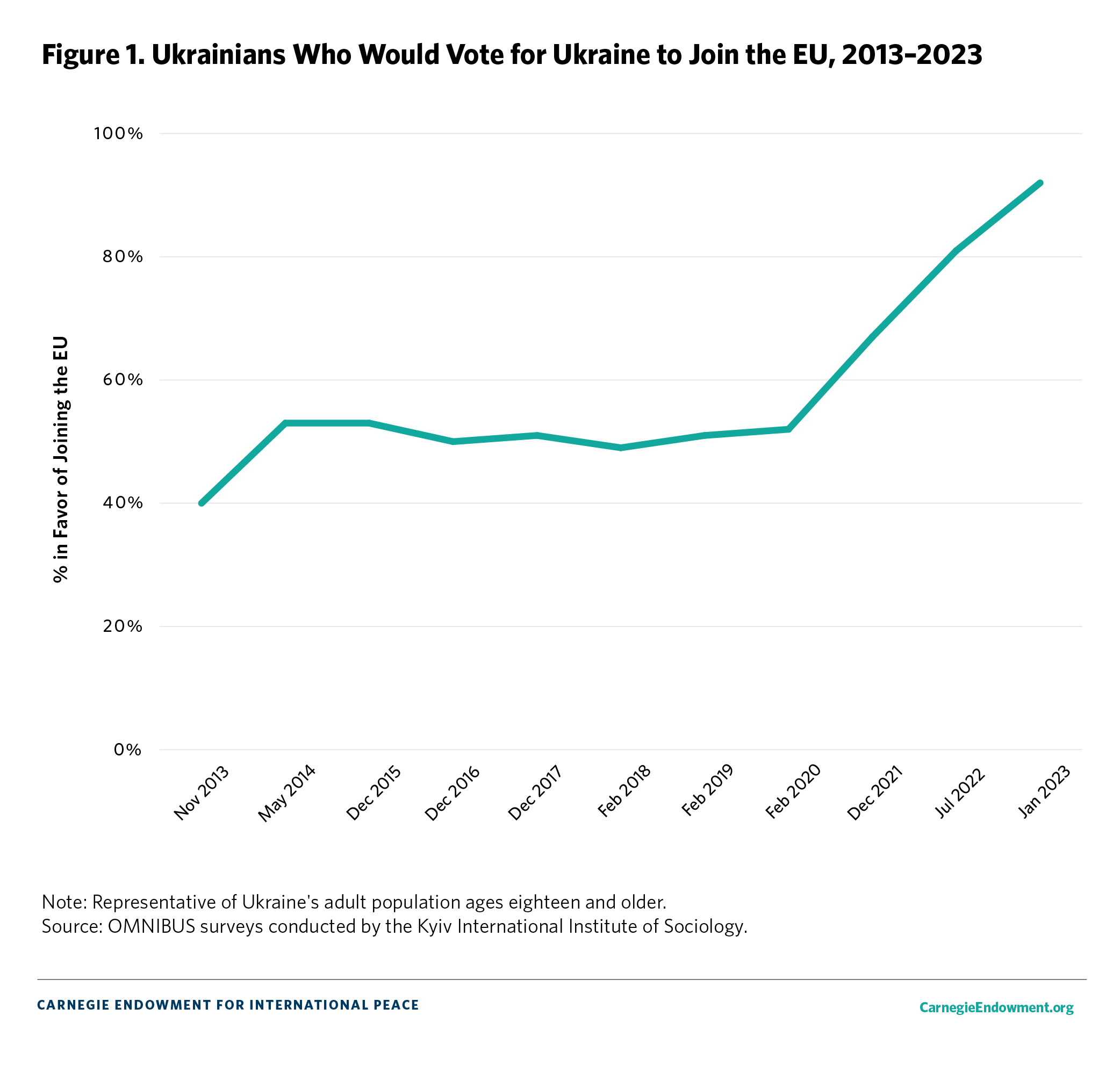
Since 2014, Ukraine has had a strongly pro-EU parliament and two presidents who have linked EU accession to Ukraine’s fight against Russian aggression and for greater democracy. President Volodymyr Zelensky, an unapologetic Russophone from eastern Ukraine who underwent a very public Ukrainization, brought southeastern Russophones who previously did not see themselves as beneficiaries of EU accession into the fold through his inclusive civic discourse.
To trace and assess such developments, good data are necessary. Thanks to the longitudinal data collected by the MOBILISE and Identity and Borders in Flux (IBIF) projects, it is possible to capture the evolution of Ukrainian public opinion toward EU integration. The project teams led by this author conducted eight nationally representative polls between March 2019 and September 2023, in partnership with the Kyiv International Institute of Sociology. The data reveal a notable surge in pro-EU sentiment, particularly after Zelensky’s 2019 election and then again after 2022 in the face of external aggression and internal challenges (see figure 2). This trend underscores Ukrainians’ entrenched desire for European integration.
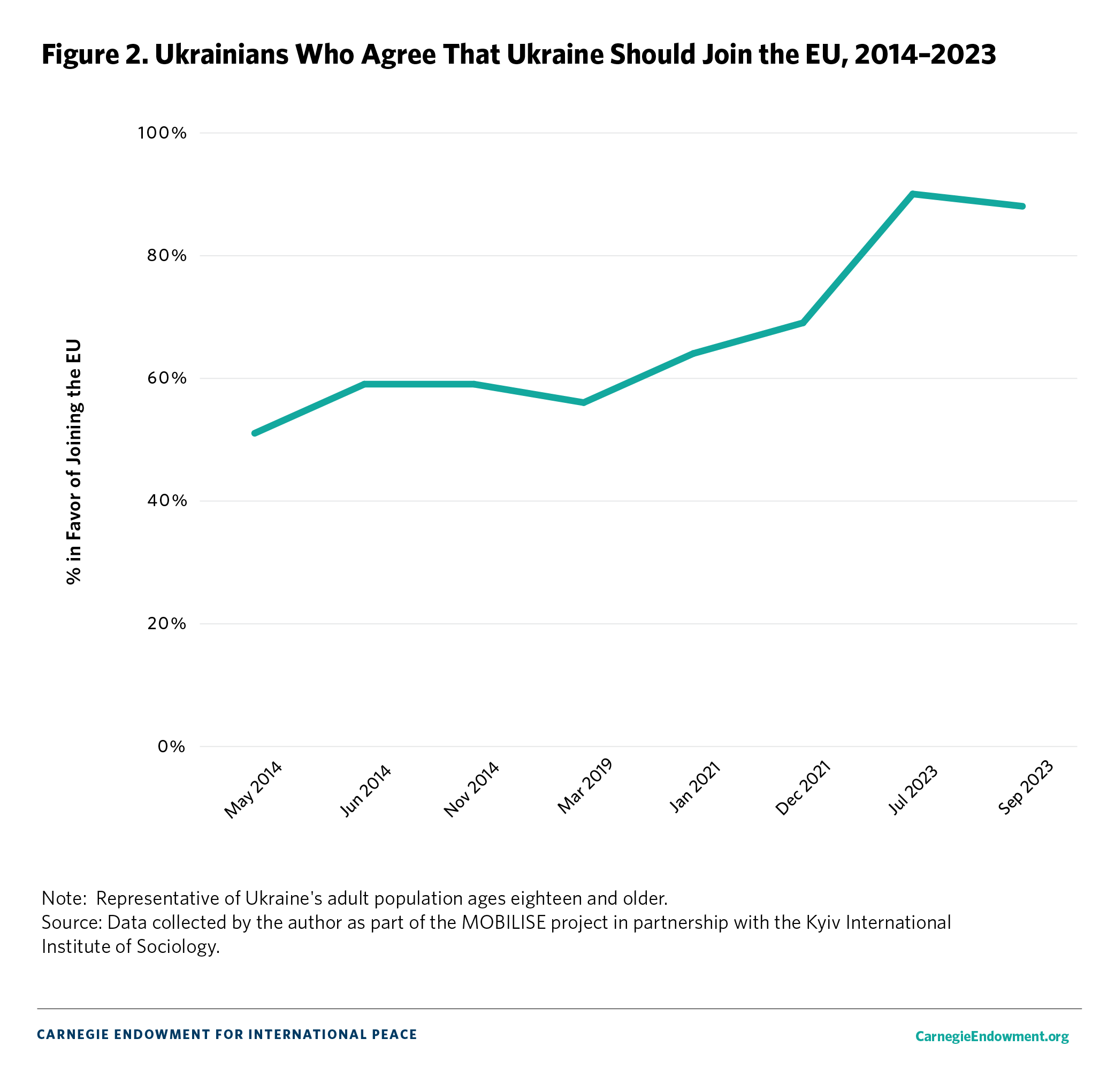
Ukrainians’ aspiration of EU membership is starkly evident in the context of the ongoing war. An August 2023 survey revealed an extraordinary consensus among the Ukrainian population, 90 percent of whom favored EU membership. What is interesting is that support for membership increased across all regions of Ukraine (see figure 3). After about a year and a half of Russia’s all-out war, there was a 25 percentage point increase in support for EU accession among Ukrainians living in the south of the country and a 28 point rise among those in the east.
This overwhelming support, which has remained steadfast since the onset of hostilities on February 24, 2022, shows a significant rallying-around-the-flag effect. The support reflects Ukrainians’ collective stance against the backdrop of conflict and reinforces a perception of the EU not only as a regional bloc but also as a beacon of a democratic normative order.
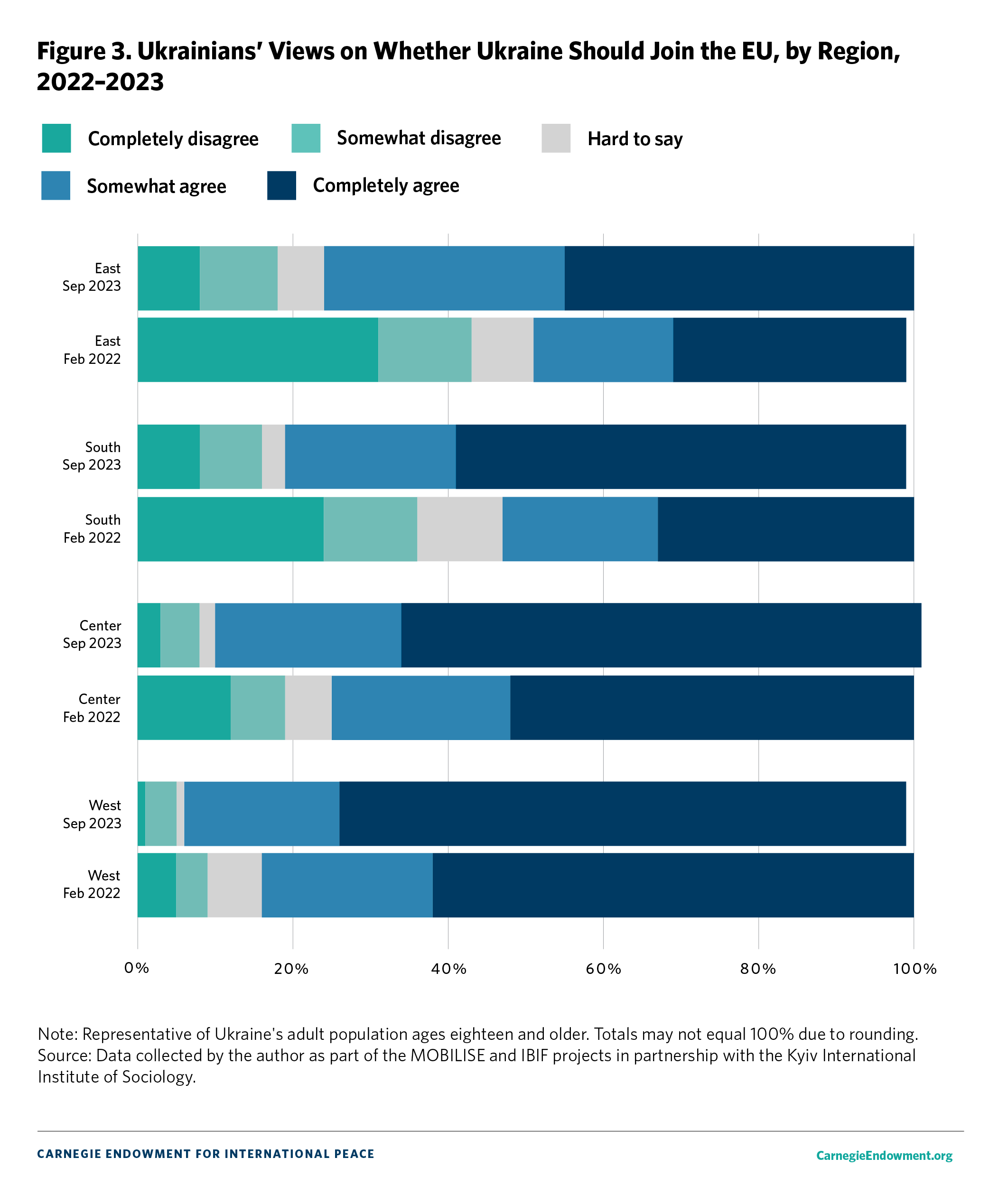
The wartime surge in support for EU membership marks a critical juncture in Ukraine’s European integration journey. It highlights the EU’s symbolic and practical significance for Ukrainians as a counterpoint to Russian aggression and an autocratic governance model. This significance enriches the narrative of Ukraine’s EU aspiration, suggesting that the union’s allure extends beyond the promise of economic benefits or security guarantees. Instead, the attractiveness of EU membership taps into a broader desire for a democratic, prosperous future aligned with European values.
What is more, amid prolonged conflict and the challenges of a seemingly slow-moving offensive campaign that has led foreign analysts to question Ukraine’s resolve, Ukrainians have an optimistic vision of their future, which is closely tied to their European aspiration. In what might come as a surprise to some, the IBIF project found in August 2023 that two-thirds of the population believed that Ukraine’s standard of living would converge with that of the EU within the next five years (see figure 4). This sentiment transcends mere hope and indicates a deep-seated conviction in the transformative power of European integration and in Ukraine’s place in the EU.
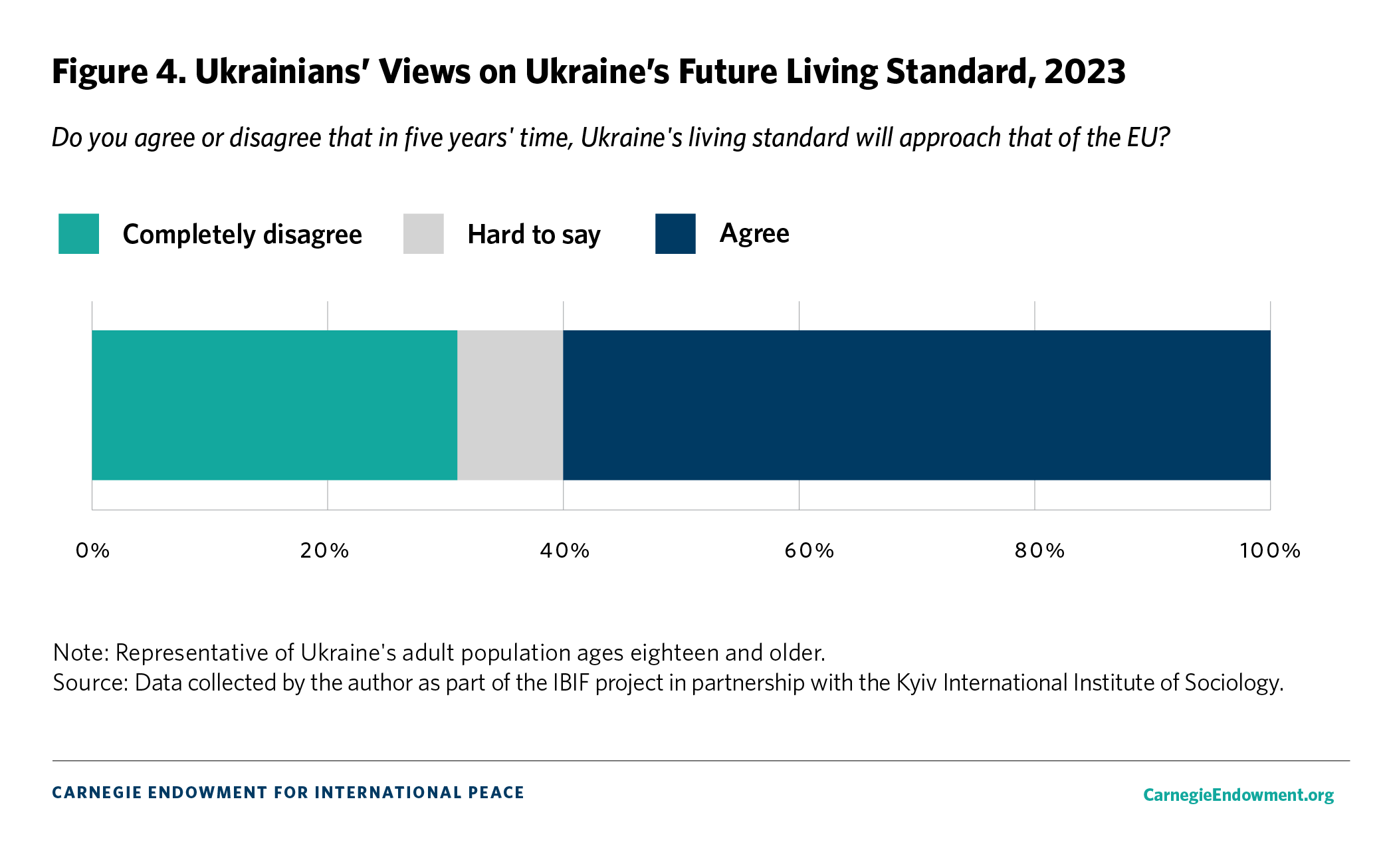
Ukrainians’ desire to join the EU does not always mean that they trust the union and its institutions. More Ukrainians support joining the EU than trust it. Back in 2019, 40 percent distrusted the union completely or somewhat. Yet, just before the start of Russia’s all-out war, the sentiment flipped to 41 percent of Ukrainians trusting the EU. And by September 2023, this number had risen to nearly 50 percent (see figure 5). This outlook has not only persisted but also strengthened during the ongoing conflict, again suggesting the war’s rallying effect and a clear delineation from the Russian autocratic model of governance. Moreover, these data highlight a deep-rooted belief among Ukrainians that their future—and, indeed, their identity—is intrinsically linked to Europe and its democratic ethos.
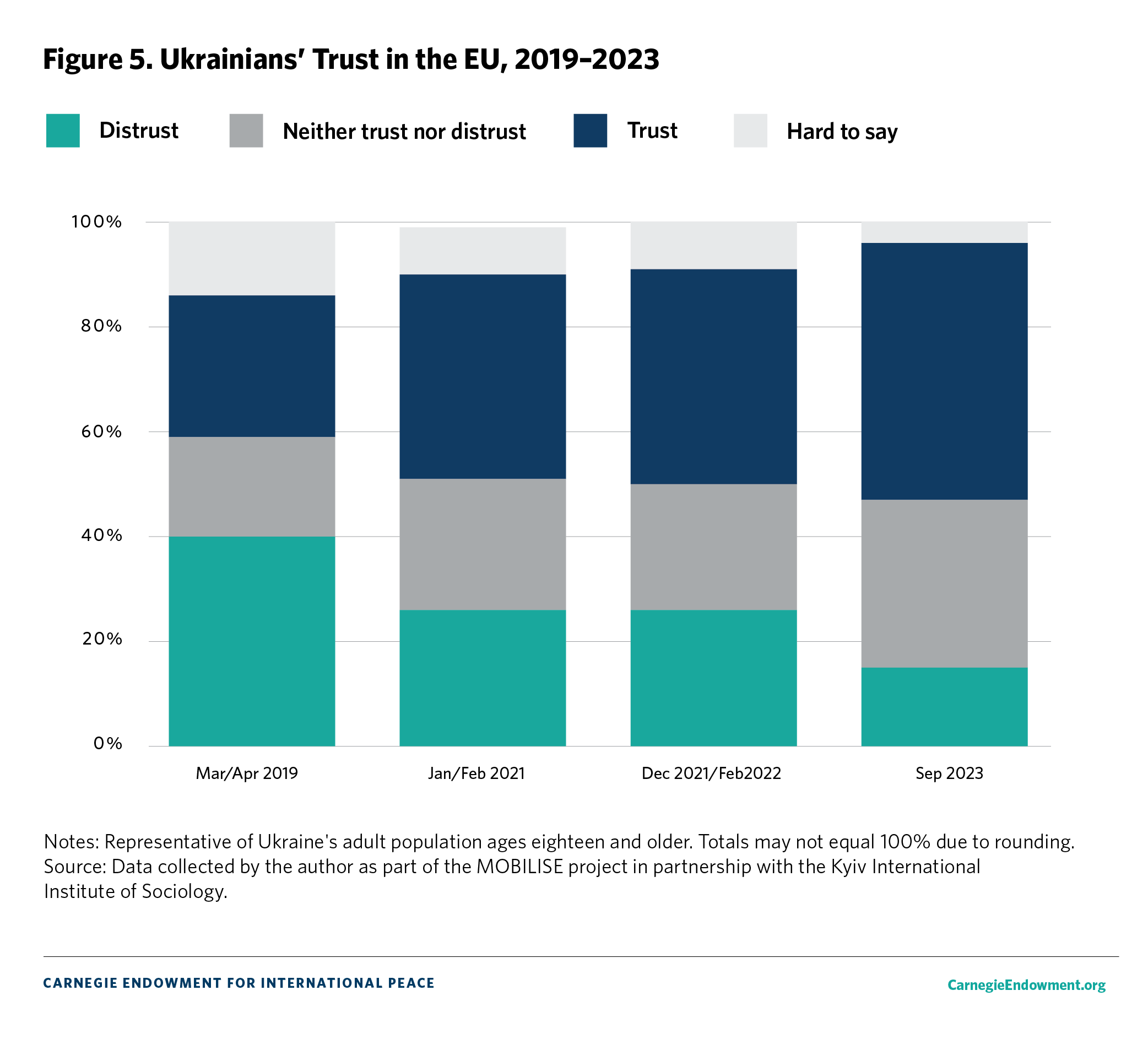
In that context, analysts and EU policymakers should pause and ask why, when some 90 percent of Ukrainians want the country to join the union, 32 percent of them neither trust nor distrust it and 15 percent still do not trust the bloc. This is likely because some Ukrainians are critical of the EU as a steadfast ally, not least in the war with Russia. This should not come as a surprise, since the EU’s record on Ukraine has been complicated, and some Ukrainians might view the EU as not having done enough or acted early enough. For example, some EU member states’ reliance on Russian energy or some EU leaders’ personal relationships with Russian President Vladimir Putin today or in the past have dimmed Ukrainians’ trust in the EU and its capacity to act in a speedy and decisive manner.
Moreover, it may well be visible even to ordinary Ukrainian citizens that while the EU has opened accession negotiations with Ukraine, some of the EU’s previous blind spots persist. Notably, there are misconceptions that permeate public discussions and presentations by EU officials, not least about how pervasive corruption was in Ukraine before the all-out invasion or how strong and robust Ukrainian democracy is. It would be worthwhile for the EU to do more to acknowledge that Ukraine’s leaders and civil society have already achieved a great deal more in terms of agricultural reform, decentralization, and anticorruption than other Eastern European states had before entering formal accession negotiations. In Ukrainians’ view, they have fiercely demonstrated their democratic credentials. Any public sense among ordinary citizens in Ukraine that the EU might drag out the accession process using the amorphous and opaque language of “fundamentals” can weaken their trust.
Finally and certainly visible to ordinary Ukrainians, the cohesive and speedy delivery of financial, humanitarian, and military support to Ukraine has seen fractures and even severe delays since December 2023. These developments might also likely reduce Ukrainians’ trust in the EU and its institutional capacity. The EU needs to iron out or work around the internal institutional bottlenecks that impede or delay the timely delivery of key support to Ukraine. This is all the more important as the war is entering its most difficult phase and support from other major allies, such as the United States, is becoming unpredictable.
If these bottlenecks prove insurmountable, the EU must work to manage expectations, because the untimely or failed delivery of support can be used by adversaries of Ukraine and the EU in disinformation campaigns. A perception that the EU has not delivered on its promises may have an adverse effect on some Ukrainians who believe they have paid the ultimate price for Europe.
Nonetheless, factors that may lower Ukrainians’ trust in the EU from the outside do not temper their belief that they belong inside the union as full members. This is because for Ukrainians, the EU represents essential democratic values. Analysis of the survey data indicates that support for such values correlates strongly with a pro-EU sentiment. Identifying as a democrat increases one’s likelihood of supporting EU membership, an effect that remains robust across demographic and socioeconomic variables. This finding challenges the notion that economic factors or geopolitical considerations are the primary drivers of EU aspirations. Instead, it points to Ukrainians’ profound and principled alignment with the democratic ideals and governance model championed by the EU.
This trend underscores the need for the EU to reevaluate its approaches, particularly toward countries like Russia, and place democratic values at the forefront of its external relations and accession policies. In doing so, the EU has an opportunity to leverage its democratic appeal strategically by fostering closer ties with countries that share its commitment to democracy and the rule of law. The EU and its member states should recommit to these principles and ensure that the union remains a symbol of hope and a catalyst for democratic transformation beyond its borders.
Although the three issues of wartime support, EU accession, and postwar reconstruction overlap considerably, there is an argument for the EU to decouple them. The technical practicalities, policy priorities, and coordination required to win the war are not the same as the policy progression needed for Ukraine’s EU accession and full reconstruction. In fact, it might be possible for Ukraine to align with most, if not nearly all, of the acquis—the body of EU law—required for accession before the country can secure a decisive victory against Russia and certainly before it can complete its postwar reconstruction.
By contrast, if the EU links these issues, such an approach might give citizens the impression that membership is being pushed back. Furthermore, Ukraine’s path to accession should not be tied to those of neighboring countries, for even in wartime Ukraine’s progress on key policy areas might be exceptional. The danger of falling short of expectations, or of not managing expectations correctly, can and will be exploited by both internal dissenters and external adversaries.
But perhaps most importantly, the EU’s approach toward its neighbors and broader policy frameworks must evolve to acknowledge the almost magnetic appeal of its democratic values. As Europe and the wider world increasingly embrace democratic ideals, with many citizens in neighboring countries aspiring for closer ties with the EU or even full membership, the response from autocratic regimes has been notably adversarial. These regimes perceive the democratic orientation and EU aspiration of their citizens as direct threats to their authoritarian grip on power.
This situation underscores the urgent need for the EU not only to recognize its democratic pull factor but also to leverage it strategically. Such an approach would solidify the EU’s role as a catalyst for change that can promote democratic governance in the face of autocracy and enhance the resilience of democratic institutions and values on a global scale.
Olga Onuch is professor (chair) of comparative and Ukrainian politics at the University of Manchester, United Kingdom.

Olga Onuch
Professor (chair) of comparative and Ukrainian politics, University of Manchester, United Kingdom
Carnegie does not take institutional positions on public policy issues; the views represented herein are those of the author(s) and do not necessarily reflect the views of Carnegie, its staff, or its trustees.
Only collective security can protect fragile economic models.

Andrew Leber
In a volatile Middle East, the Omani port of Duqm offers stability, neutrality, and opportunity. Could this hidden port become the ultimate safe harbor for global trade?
Giorgio Cafiero, Samuel Ramani
Europe’s reaction to the war in Iran has been disunited and meek, a far cry from its previously leading role in diplomacy with Tehran. To avoid being condemned to the sidelines while escalation continues, Brussels needs to stand up for international law.

Pierre Vimont
Two experts discuss how drone technology is shaping yet another conflict and what the United States can learn from Ukraine.


Steve Feldstein, Dara Massicot
Arguing that Chinese policy is hung on alliances—with imputations of obligation—misses the point.

Evan A. Feigenbaum